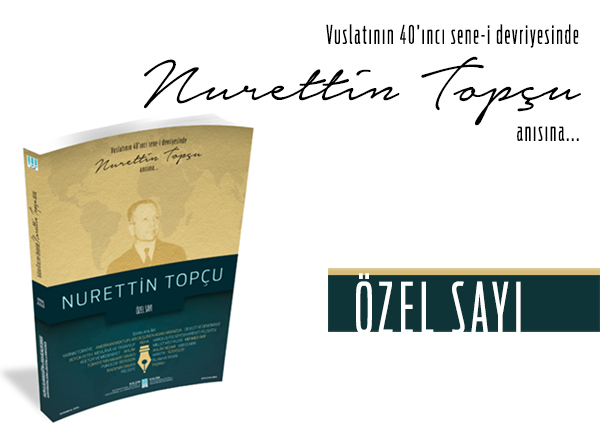KALEM INTERNATIONAL JOURNAL of EDUCATION and HUMAN SCIENCES
Owner and Editor-in-Chief :
Doç. Dr. Osman SEZGİN - Marmara Üniversitesi - Türkiye
Editor :
Doç. Dr. Hasan Basri GÜNDÜZ - Yıldız Teknik Üniversitesi - Türkiye
Published in : İstanbul - 2015
ARTICLES IN THIS ISSUE
Dr. Mustafa KÖK
In the Light of A New Civilization Theory; Problem of Culture, Civilization and Westernization at Nurettin Topçu
Abstract
|
Full Text
Ziya Gökalp is the first thinker who makes a scientific differentiation between civilization and culture in our country. According to him, culture is national but civilizations are international. Culture is general and formed unmethodically but civilization is formed with invidual-voluntary efforts and methodically. As culture can not be imitated, civilization can be taken through imitation. Culture is composed of emotions, inspirations and intuitions but civilization is composed of information, in other words; mental activities. For this reason, nations can not imitate each others’ religious, moral and aesthetical emotions but they can have information exchange among themselves. Gökalp’s this differentiation and thesis of modernity were criticised by various thinkers and scientists. In this article, it is not our purpose to deal with who said what on this issue from the beginning or which criticisms were directed against Gökalp. Our purpose is to determine the place of contemporary Turkish thinker Nurettin Topçu and try to understand him based on the theory of Yılmaz Özakpınar who brought the most recent and radical criticism in this issue. Özakpınar shakes Gökalp from the ground with the questions he asks in his book of “Changes of Culture and Problem of Westernization” such as, “Can the components of logical differentations Gökalp did be in a separable situation from each others even within the reality of phenomena? For example, are the components of emotion and mind of a social structure like the detachable-mountable mechanical elements? Or can a component of mind, in other words; civilization which is said to be international, be taken from one nation by purifying from emotions and be mounted into another nation’s emotions?” According to Özakpınar, the theory of Gökalp is inconsistent. In the background of all theoretical analyses, there is another and different theory of civilization constituted by Özakpınar himself.
Doç. Dr. Mustafa GÜNDÜZ
A Conservative-Modernist Republican Intellectual: Nurettin Topçu and His Educational Views
Abstract
|
Full Text
Nurettin Topçu is one of the prominent educator and moralist of Republican period. His struggle for life, stability, seriousness, methods, concepts that he used, and obtaining of knowledge, makes him significantly different among the contemporary intellectual. Topçu thought with every issue of the life and have made a special place for education and remarked that Turkey has deep rooted educational problems. According to him, nationalistic character of Turkish education has serious problems. Educational system quite troubled in term of both aims and philosophy. Western origin systems have crippled the educational system. The initiation of this bad situation goes too back. In addition to him, madrassas became a center of scholastic, and the new schools which was opened instead of them, continued the same legacy by imitating Western life. Foreign schools, teaching with foreign language and private schools are other basic problems of the educational system. There are the great depression in the field of teaching of religion and morale. Topçu severely criticized the religious functionaries and teaching of religion and morale methods after 1950. He defended an educational life that completely national and under control of the state, but he definitely rejected religious education given by the state. In this paper, it has been argued that how Nurettin Topçu who is recognized with his pro-conservative identity and known as the leading name of “Ethics of Revolt” as well as the defender of Anatolianism policy evaluated the different problems of education and educators, how he analysed and criticised such matters and what kind of proposals he offered on these problems by a way of criticizing some of his views.
ISSN : 2146-5606

